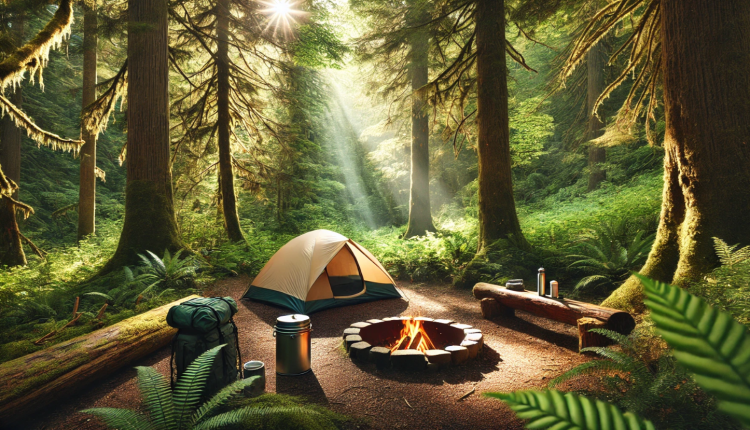The Art of Minimalist Camping: Embracing Nature with Less
In today’s fast-paced world, camping offers a retreat into nature’s embrace. While traditional camping often involves extensive gear and supplies, minimalist camping encourages a return to basics, focusing on simplicity and a deeper connection with the environment. This approach not only reduces physical burdens but also fosters mental clarity and appreciation for the natural world. By embracing minimalist principles, campers can experience the joys of the outdoors without unnecessary distractions.
Understanding Minimalist Camping
Minimalist camping is about stripping down to essentials, carrying only what is necessary for survival and comfort. This method emphasizes:
- Lightweight Gear: Choosing multifunctional items that serve multiple purposes.
- Skill Development: Relying on outdoor skills rather than equipment.
- Environmental Respect: Leaving minimal impact on nature by following Leave No Trace principles.
Minimalist camping challenges traditional camping norms, urging adventurers to rely on their knowledge and the natural resources around them instead of extensive tools and gadgets. This stripped-back approach not only simplifies the experience but also makes it more fulfilling.
Benefits of Minimalist Camping
- Enhanced Mobility: With less gear, campers can explore more remote areas inaccessible to heavy packers. Reduced load also means less physical strain, enabling longer and more enjoyable treks.
- Cost-Effective: Reducing equipment needs leads to financial savings. Investing in fewer, high-quality items ensures durability and efficiency, saving money in the long term.
- Deeper Connection: Simplifying the camping experience allows for greater immersion in nature. Without distractions, campers can fully appreciate the sights, sounds, and sensations of the wilderness.
- Environmental Stewardship: Carrying less reduces waste and environmental impact. Fewer items mean less potential for litter or pollution, aligning with eco-friendly principles.
Essential Gear for Minimalist Camping
While the goal is to minimize, certain items remain crucial for safety and comfort. Packing smart is the key to a successful minimalist adventure:
- Shelter: A lightweight tent, tarp, or bivy sack that provides adequate protection against the elements.
- Sleep System: Compact sleeping bag and sleeping pad, ensuring rest and insulation from the ground.
- Cooking Essentials: A small stove or the knowledge to build a safe campfire, along with a single pot, spork, and lightweight food options.
- Clothing: Weather-appropriate, moisture-wicking layers that can be mixed and matched for varying conditions.
- Navigation Tools: Map, compass, or a GPS device, alongside the knowledge to use them effectively.
- First Aid Kit: A compact kit tailored to personal needs, including basic medications and bandages.
- Hydration Gear: Water purification tablets, a portable filter, and a durable water bottle.
Skill Development
Minimalist camping thrives on resourcefulness and adaptability. Developing the following skills will greatly enhance your experience:
- Fire Building: Mastery of starting a fire in various conditions using natural materials like dry wood and tinder.
- Foraging and Food Prep: Identifying edible plants, berries, and fungi while ensuring they are safe for consumption. This skill not only reduces reliance on packed food but also deepens your connection with nature.
- Navigation: Reading topographic maps, using a compass, and recognizing landmarks are essential for staying on course.
- Shelter Construction: Knowing how to build effective shelters with available natural resources in case of emergencies.
Planning Your Trip
Preparation is the foundation of a successful minimalist camping experience:
- Research the Location: Understand the terrain, climate, flora, and fauna of your chosen destination. This knowledge helps in packing and preparing appropriately.
- Check Weather Conditions: Staying informed about weather forecasts can prevent unforeseen complications and guide clothing and gear choices.
- Plan Your Route: Map out your journey, marking water sources, potential campsites, and escape routes.
- Inform Someone of Your Plans: Share your itinerary with a trusted friend or family member, including estimated return times and emergency contact details.
Safety Considerations
Minimalist camping does not mean compromising safety. Even with fewer items, prioritizing health and preparedness is essential:
- Stay Hydrated: Always know how to locate and purify water in the wilderness. Dehydration can quickly lead to serious complications.
- Food Safety: Properly store food to prevent attracting wildlife. Lightweight bear bags or canisters can help protect both you and the animals.
- Emergency Preparedness: Equip yourself with knowledge of basic first aid and carry a whistle or signaling device for emergencies.
Environmental Impact
A core principle of minimalist camping is respecting and preserving nature. Minimalist campers often lead by example, practicing eco-friendly habits such as:
- Leave No Trace: Pack out all waste, minimize campsite alterations, and respect wildlife habitats.
- Use Sustainable Practices: Choose biodegradable soap and reusable containers, and minimize single-use plastics.
- Respect Local Regulations: Many areas have specific rules to protect delicate ecosystems; adhere to these to avoid unintentional damage.
Challenges and Rewards
Minimalist camping is not without its challenges. Adapting to a lighter load can initially feel limiting, and relying on skills over gear requires practice. However, the rewards far outweigh the difficulties. Campers often report a sense of freedom and satisfaction in living simply, without the distractions of modern conveniences.
The process of overcoming challenges fosters resilience and a deep sense of accomplishment. Each trip becomes a personal journey of growth and discovery, providing unforgettable experiences.
Conclusion
Minimalist camping offers a transformative way to connect with nature, emphasizing simplicity, sustainability, and self-reliance. By focusing on essential gear, honing outdoor skills, and respecting the environment, campers can unlock a more profound and rewarding wilderness experience. Whether you’re a seasoned adventurer or a beginner, embracing the minimalist ethos can redefine how you interact with the great outdoors.

